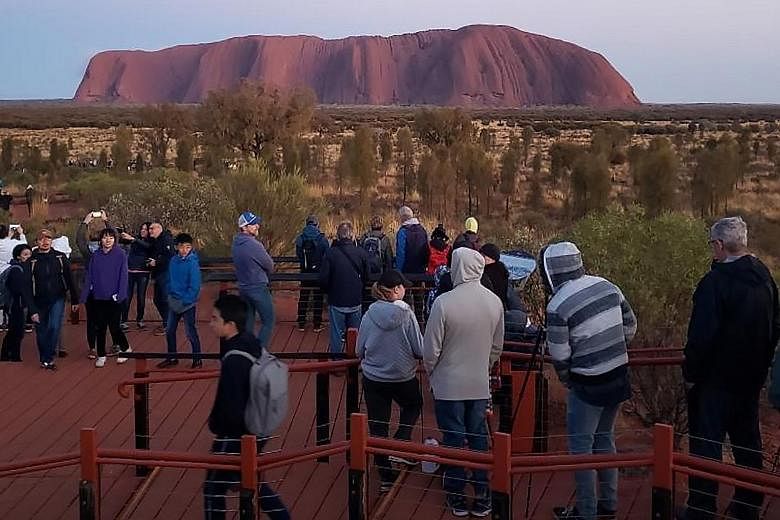In outback Australia, hordes of people have been queueing each day to make the trek to the top of Uluru, or Ayers Rock, an enormous sandstone rock that is one of the country's most famous landmarks.
The visitors - about 1,000 a day - are rushing to make the controversial ascent before a ban takes effect on Oct 26.
The ban was announced in 2017 to respect the rights of the traditional Aboriginal land owners, who regard the rock as a sacred site. The Anangu Aboriginal people spent decades seeking to prevent visitors from climbing it. They also cited concerns about safety and erosion.
At least 37 people have died making the 348m-high climb since the 1950s.
The climbing ban has proven divisive. Many recent visitors said they view the climb as a part of modern Australia that should be retained. But this has been criticised by others as disrespectful and racist.
The recent visitors included far-right anti-immigrant firebrand Pauline Hanson, who made the climb earlier this year but required assistance to descend. She claimed the rock "belongs to all Australians" and likened the ban to closing Sydney's famous Bondi beach.
A 52-year-old tourist, Mr Jeff Lis, told Australian Associated Press: "I was born in Australia, it is part of my culture and ancestry as much as anyone else's but I'm not laying claim to it, saying it is mine or a sacred site or anything like that."
However, others denounced those rushing to climb the rock, saying it was offensive to Australia's indigenous people.
An indigenous writer and commentator, Ms Celeste Liddle, said the streams of climbers were "defiant 'knuckleheads', winding around the base like a river of White Australian entitlement".
"These climbers feel they must climb to prove a point but the sole point they're proving is their unacknowledged racism," she wrote on the 10 daily news website.
The rock is in the largely uninhabited centre of Australia, about 470km from the town of Alice Springs in the Northern Territory.
Most visitors these days do not make the climb, opting instead to admire the rock from the base. Since 1992, a sign at the base of the rock has asked people not to climb out of respect for the Aboriginal owners.
In the past three decades, the country's Aboriginal community has gradually won greater legal rights and broader public acknowledgement of their customs and law and of the historical injustices they had suffered following British colonisation. This led to a decision to hand back the land around Uluru to the traditional Anangu owners on Oct 26, 1985, and has also prompted efforts to respect the community's laws and customs.
Data collected by Parks Australia shows that just 13 per cent of visitors to Uluru last year made the climb, down from 74 per cent in the 1990s. Statistics also show that 80 per cent of visitors supported the permanent closure of the climb. Despite the drop in climbers, the number of visitors to the rock increased 22 per cent last year.
Most visitors are Australian, followed by those from the United States, the United Kingdom and Japan. Tourism Central Australia said international tourist numbers have been increasing due to the falling Australian dollar. Altogether, about 300,000 people visit the rock each year. About 5,000 Singaporeans visit the Northern Territory each year, though most go to Darwin and only about 1,000 visit Uluru.
Traditional land owner Sammy Wilson said the local community welcomes visitors, adding in a statement that those who walked around the rock "will start to understand us". "It is an extremely important place, not a playground or theme park," he said.

